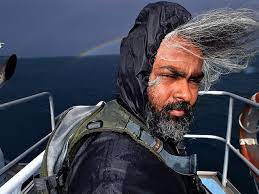Interview with Raj Sekhar Aich, Author of 'Iridescent Skin'
on Apr 08, 2022

Raj Sekhar Aich, with PhDs in marine anthropology and applied psychology, has been recently awarded professorship at the Sister Nivedita University.
His research focus is in the field of the holistic study of cultural- and natural-scapes shaped by physical and symbolic interactions of humans with the marine environment and life forms.
He has conducted the first-ever white shark cage diving ethnographical research (New Zealand), and the first academic investigation of the Sundarban shark attacks (India). Through his work, he looks towards further contributing to transdisciplinary research, marine social sciences, and anthrozoology.
Frontlist - This book is classified into three parts: Abhisar, Apeksha, and Milan. How did you get the idea that you should write the book in this format?
Ans: I realized that this journey for the narrator was like him waiting and making a journey for his eternal lover—that is where the three parts came from.
Frontlist - ‘Iridescent Skin’ outlines the ethnography of humans and white sharks. Please share any encounters you had with white sharks during this exploration.
Ans: Although my experiences of meeting white sharks have been explored in-depth in this book, the only thing I would add here is—it is like being in the presence of a spirit who is much grander than me. It is not an animal, but power, and it is a blessing to be able to witness them in their natural environment.
Frontlist - You could’ve chosen another marine creature. What tempted you to research about the white sharks?
Ans: The white shark is the epitome of marine strength. To me they symbolize millions of years of evolution, and fine tuning. Just like any other shark scientist, whenever we think of sharks, the first one that comes to our mind is the white shark.
Frontlist - The book entails comprehensive yet extensive research about human and shark encounters. How much time did it take you to complete this book?
Ans: From start to finish it took me 7 years.
Frontlist - We have preconceived notions about creatures due to the available content on the internet. Is this the main reason that humans have biases against them?
Ans: As I explained in my book, the reason human beings have negative ideas about sharks is as much related to media as it is our instinctual fear of the darkness and the unknown. There are many factors, including aesthetic, existential, evolutionary, media, and sociological which culminates together to create this hyperreal (more than real) image of a beast in the oceanic wilderness.
Frontlist - What is the reason that sharks are on the verge of depletion. How can we save them?
Ans: There are many reasons for this, due to the negative image of them in the public imagination, there is not enough initiative to conserve them as opposed to other marine creatures like whales. Overfishing, beach netting, hunting, and probably the most important reason is bycatch.
Frontlist - Most of the chapters have your journal entries. How will these entries help the readers understand more about the relationship between white sharks and humans?
Ans: These journal entries are as much a look into my own soul, as they are doors to interpretation of liminalities of sensations and realizations for the readers to explore.

.jpg)
.jpg)
.jpg)
.jpg)
.jpg)

.jpg)
.jpg)
.jpg)
.jpg)
.jpg)


_(1).jpg)
.jpg)











Sorry! No comment found for this post.